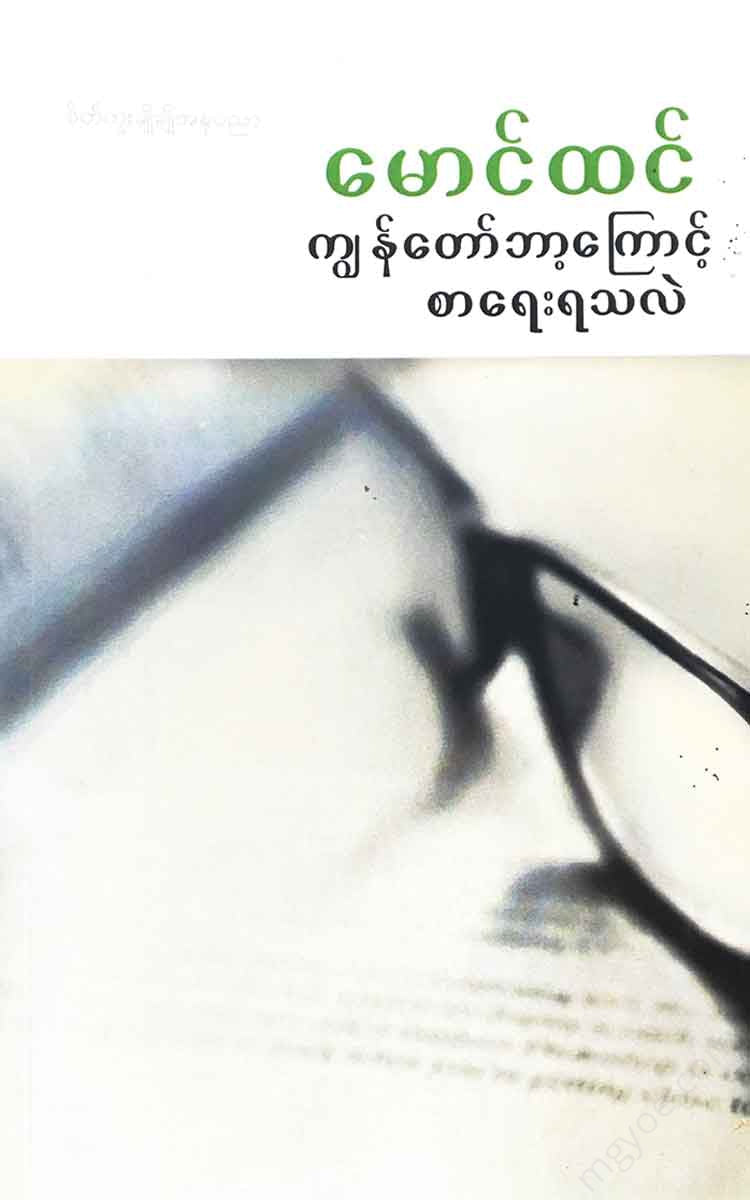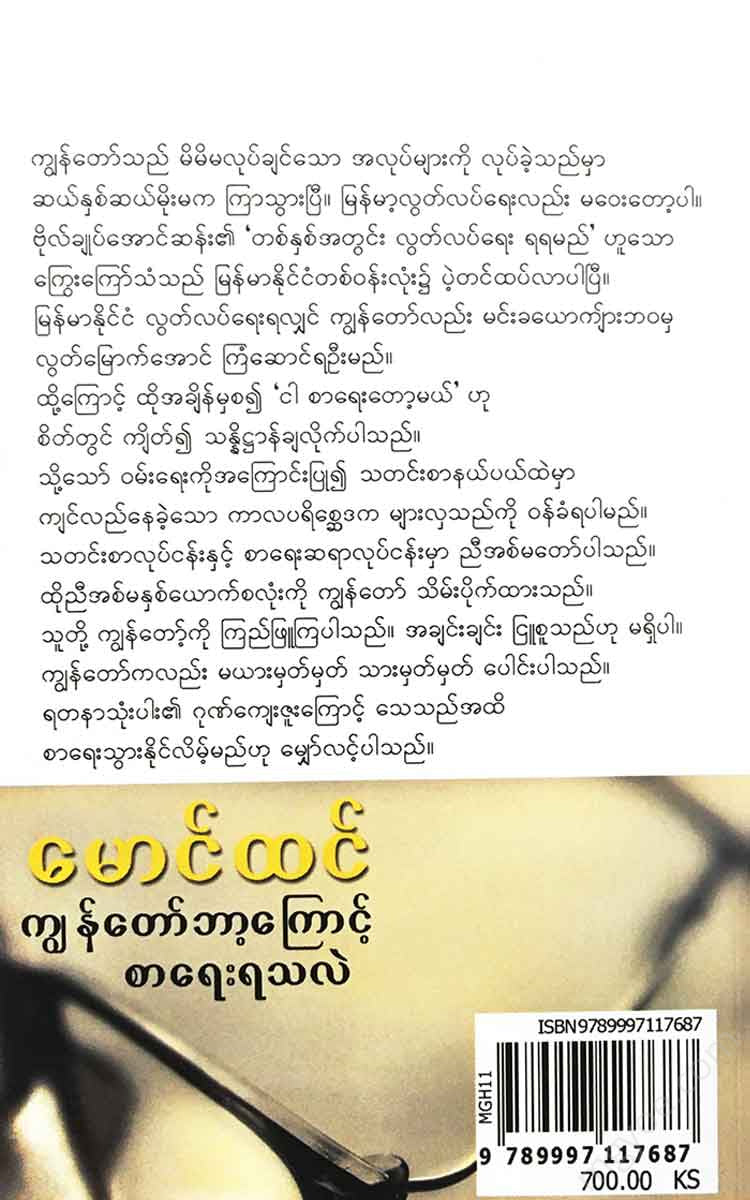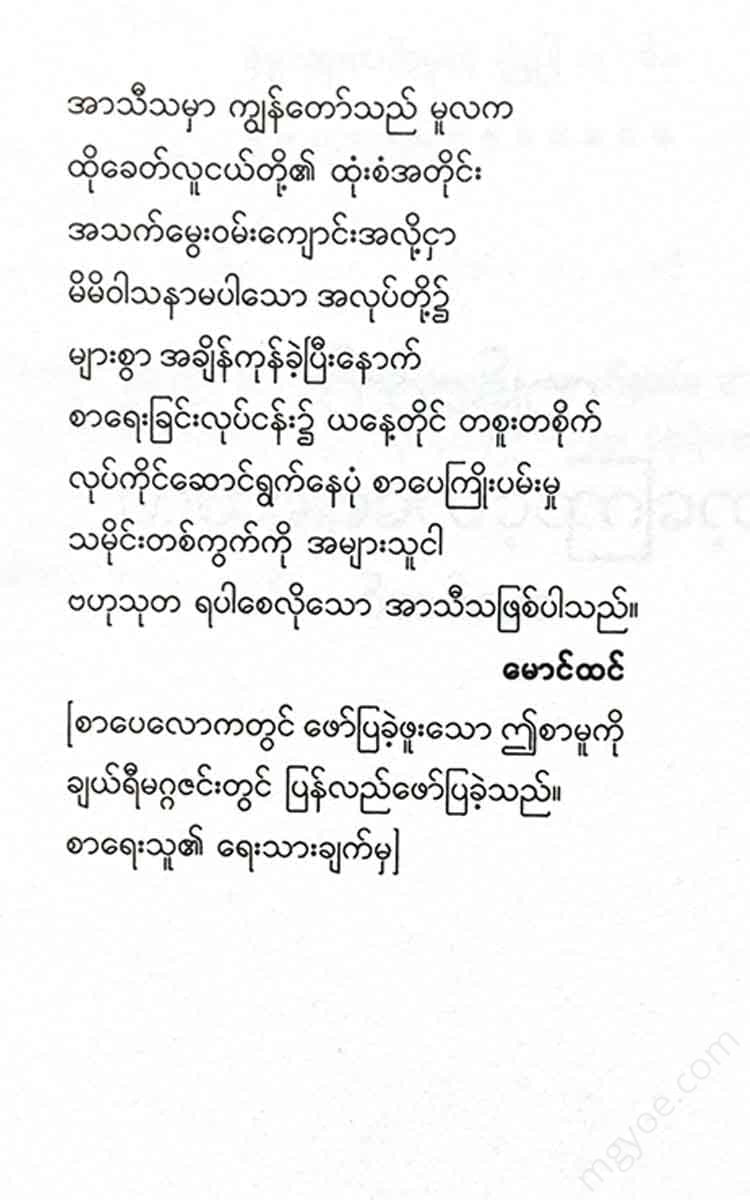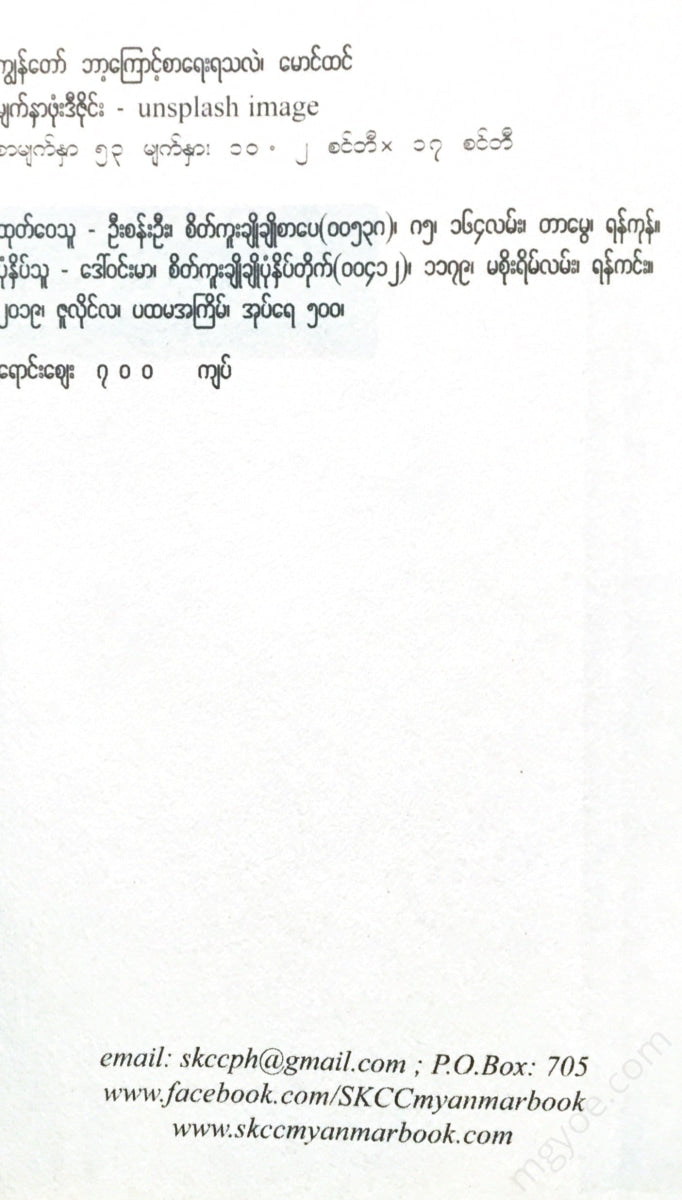စိတ်ကူးချိုချိုစာပေ
Maung Htin - Why do I have to write?
Maung Htin - Why do I have to write?
Couldn't load pickup availability
[ 1 ]
I have written about this in magazine issues and in the introductions to my short stories, novels, and collections of articles, as the case may be. I don't think this will be new to those who have read and studied my writings. However, I would like to present the information that I have written in scattered and scattered places.
In presenting this, I am not rereading and quoting what I have already written, but rather presenting the matter that comes to my mind, as much as possible.
When drawing from memory, there will be some metaphors. However, when an artist paints a whole forest, he will not paint each tree individually. He will only paint the whole forest. Even if the details are not clear, the whole thing will appear as a forest.
If you ask me why I write, I will answer, "I write because I want to write."
Those who are prone to misinterpreting a single letter or a single word will remember me as “tae” or “tae” or “tae” or “tae”. Especially those who are prone to jumping to conclusions before investigating the matter, tend to misinterpret it in this way, with the intention of being rude to themselves. I do not consider these to be offensive.
However, I have said this in advance with the intention of making the reader understand the meaning of straight and crooked.
There are many tricks in literature. It can be called the art of Maya. Those who are interested in literature will have come across such concepts as calling white black, calling black white. The author may be speaking seriously with the intention of humor. The author may be making a joke but speaking seriously. In such cases, if the reader can take the author's tone of voice to heart, he can take it as his own. Only then will he find joy in the laughter. He will find solace in the sorrow. Only by knowing the author's tone can the knowledge contained in the text he reads benefit the reader. If he can read in this way, he will be able to gain insight into the text even if he reads a text without any knowledge.
Only when a creator has the will to create can his creation be good. If he does not want to do a job and does it with a pinch of salt, that work will not even be as good as the water that flows from the leaves. Especially if an artist who is related to the art of creation works without the will to create, the taste of that work will not be able to be felt by those who enjoy it.
Therefore, without the desire to do, the desire to speak, the desire to write, it is impossible to want to do, to say what you want to say, to write what you want to write. Only the power of desire can bring creation to fruition.
But desire must not be against the law. It must be just. If you want to be a swimming champion without having perfect limbs, you will only be frustrated.
I want to be a writer without being able to write. I want to be a rich man without being able to trade. I want to be a chief without being able to manage my own household. These are also desires. But is it right to want? If not, then I will not get what I want and will be miserable.
If you really want it, you have to try to make it happen. If an illiterate person tries to learn to read, he may want to become a writer. If an illiterate person tries to learn to trade, he may want to become a rich man. If an illiterate person tries to learn to manage, he may want to become a chief.
As the saying goes, passion is the root of desire. I wrote an article called “Passion” in the Shumawa magazine in the early days of independence. In that article, I briefly described how I moved from a job I didn’t have any passion for to a job I had a passion for.
However, my primary passion is not writing, but reading.
When I was young, I was fortunate enough to have access to and grow in literature such as Myanma Alin Magazine, Thuriya Newspaper, Mr. Maung Mhoing's Tale, Antonio Merchant's Novel, Maung Soka's Dream Room, Rupanandi, Khin Myint Gyi, Yadana Pon, and Tsin Taw. When I say fortunate enough, I mean very fortunate. Because at that time, in my hometown, which was just a hamlet, the only person who read that literature and knowledge from Yangon was my father. In fact, it was only because of my father that I developed a love of reading.
I can say that Rupanandi and Yadanabon novels are honest and clear in their literary style, and I can understand everything I read. After reading them, I have various ideas. Sometimes, while reading, I miss someone without knowing who I miss. However, I still don't understand the words of the great writers.
I read while cooking and the pot of rice was broken. I read while babysitting and the child fell. I read while housekeeping and the dog came into the kitchen and scratched the pot of rice.
When I moved from a village school to a city school and studied English, I didn't just study the textbooks. I read everything I could get my hands on, from the number 40 and number 80 drama books to the Dagon magazine I had saved up my pocket money to buy. Number 40 and number 80 are the names given to me by the bookstores, referring to the 40 and 80 pages of a book.
When the Susarita Youth Association was established on Kluang Kone Road in Myaungmya, a reading room was opened. That reading room was the one that planted the seeds of political awareness in my brain.
When I finished the big board, I thought I could read everything. However, when I actually read it, I realized that I couldn't read even a single word. But I didn't give up. If I didn't understand, I would read all the commentaries and commentaries written by Mr. Maung Mhai over and over again. I also listened to my father read these commentaries to others over tea. When my eyes and ears became accustomed to them, I read the four books, including the history, the Mahavin, the Adi Kappa, etc., and I began to understand the meaning. At that time, I also read the world of Pe Moe Ning's book. I also read the book of the kings of the world
The more I read, the more I realized that there were so many things I didn't know. I read to know what I didn't know. When I knew one thing, two more things I didn't know. So I read to know more. I still haven't finished reading it.
In our time, every student had to learn based on classical literature. Whether studying Burmese literature or English literature, they studied and memorized to keep up with the literary geniuses of the past. Because they were also familiar with modern literature, we were able to see the connection between ancient and modern times.
When I studied at university, I gradually came to understand the value of the vast Western sciences and arts.
When science and science meet, I read the dog's commentary aloud, wondering if I should become a doctor. The writings of the great master, Thakin Keng Taw Hmoing, are delicious when read aloud.
Then, separated from science, and united with art//







